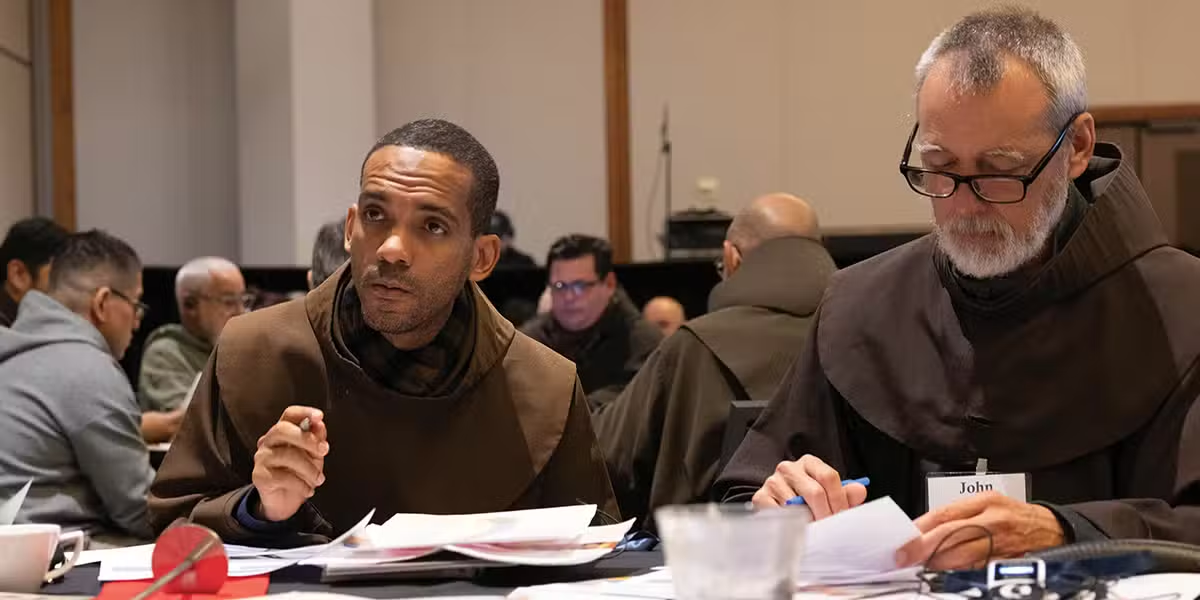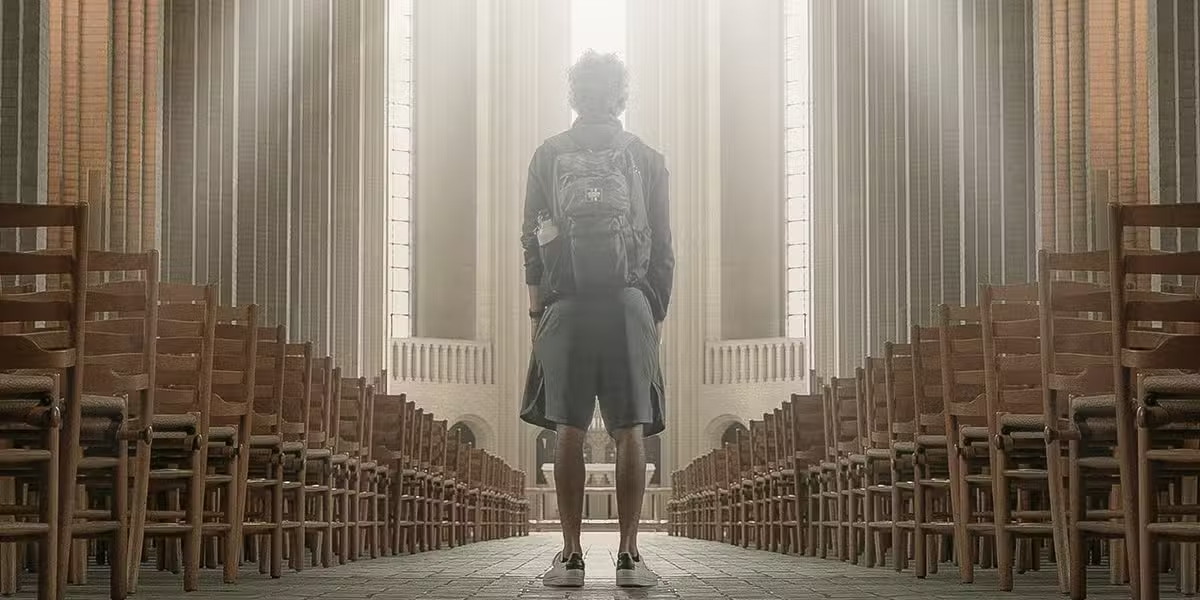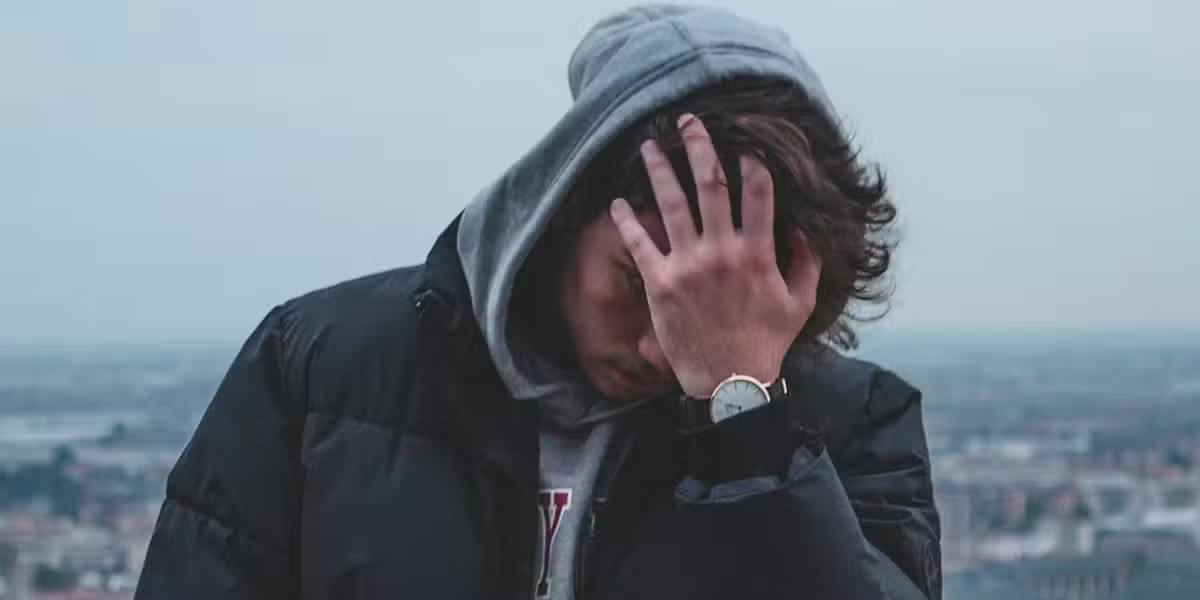Franciscan charism, lifestyle, and mission—those were the three things discussed at the recent Franciscan synod.
When the Franciscan friars of Our Lady of Guadalupe Province gathered in January in Kansas City, Missouri, they came to do one thing—listen to where the Holy Spirit was leading them. They accomplished this through the culmination of much reflection, discussion, prayer, and camaraderie.
The Franciscan synod was inspired both by the Catholic Church’s current Synod on Synodality and the formation of the new Our Lady of Guadalupe Province in October 2023. Brother Keith Douglass Warner, OFM, says as part of that change, the friars also wanted to find ways to renew themselves. A synod seemed the perfect vehicle to help them do just that.
“It nicely aligned with the [2025] Jubilee Year theme of hope, because we’re trying to be messengers of hope and reconciliation in a world that’s struggling,” says Brother Warner, director of renewal for the province and a key figure in the planning for the synod.
Walking Together
The average Catholic may have heard of the term synod but not have a good understanding of what the process truly means or looks like. So what is it? “If you were to translate synodality into everyday words, it would be listening and discerning together,” says Brother Warner. Discernment is a part of our Christian tradition and has been practiced especially by religious orders, but not only them.
“I think that part of the universal call to holiness from Vatican II is going to be reflected in this desire for the discernment together as something that all people are called to do because it has to do with how we live the Gospel and respond together in community,” says Brother Warner.
The goal of the Franciscan synod was threefold: To discern the path the friars should walk together into the future, especially in the face of difficult choices about ministry, resources, and lifestyle; engage deeply in a process of renewal of their charism, lifestyle, and mission; and further form their identity and culture as one new province.
Brother Warner says that when the province reorganized, the friars made it clear that they didn’t want things to be business as usual.
“They didn’t want just an administrative restructuring; they wanted efforts to renew our life and charism,” he says. “We were doing what we’ve always done, and people started to realize we need a fresh approach that reflects the best of our tradition, the best of our imagination, and to discern that we need to do that together.”
When the friars gathered in January, they built on over a year’s worth of work. Friars and ministry partners gathered locally last winter and spring to discuss three questions: Which facets of our charism are we called to express in fraternity, Church, and world today? How are we called to live out fraternitas and minoritas concretely in our daily lives? What priorities should guide our mission and evangelization over the next three, six, and nine years?
The discussions continued in the fall, when almost 300 friars gathered for seven regional synodal assemblies to review and discuss the reports from the first round.
At the end of last year, a group of young adults from across the country gathered with friars to discuss three topics: the hopes and dreams young adults hold for the Church, the relevancy of Franciscan spirituality among young people today, and ways Franciscans can better accompany young people.
Finally, in January, the friars culminated the year of preparation by gathering with secular Franciscans, Franciscan sisters, and lay partners to discuss on a national level where the Holy Spirit was calling the order to go.
Darleen Pryds, PhD, a professor at the Franciscan School of Theology at the University of San Diego, was one of the lay participants. She says the discussions at the tables were thoughtful and spirit-filled.
“I noticed a breakdown of habitual reticence to speak truth. I noticed a deep listening with undivided attention and uncharacteristic pauses that allowed each person to consider their words and their thoughts/beliefs before sharing,” she says.
Prayer, she adds, was a key part of the gathering. “We prayed at the beginning of each session, and we had communal morning prayer, evening prayer, and Mass. Without the liturgical prayer, the synod is just another meeting.”
Brother Michael Reyes, OFM, served as a facilitator for one of the discussion tables. He says the process was a good one, for he believes we’ve become a society that has forgotten how to listen. “We think we’re listening, but actually we’re trying to come up with a response in our head or a judgment already in our head,” he says.
“I think the concept of synod brings us back to the very basic idea of listen without judgment, listen without any intention.”
A Messy, but Necessary, Process
But as with any discussion, there can be tension and disagreements. Father Roger Lopez, OFM, says that’s just part of the process, though.
“I would say one of my takeaways from the synod is that the synodal process is messy. It’s not linear. It’s not A+B will equal C. It’s like subset 1, subset 2, subset A234,” he says. The process may also “take us places that we don’t want to go and challenges us in ways that we are afraid. The synodal process requires patience. It requires being gentle with each other.”
The benefit, he says, “is that people are heard and listened to, and you come out where everyone realizes it may not have gone the way I thought, but I can get behind this because I was part of the process.”
He recalls a story about St. Francis, where the saint was asked, of all the friars, who was the perfect brother. “Oh, I know that. It’s Juniper because of his humility. It’s Leo because of his attentiveness to detail. It’s Ruffino because . . . and he started going through this list. He pulled out the attributes of every single friar.”
The point of the story, Father Lopez says, is that “the perfect friar is not found in one person. It’s found in the collection of all of us. We’re trying to bring about the best parts of who we are.”
Brother Reyes agrees. “I think that’s the beauty of the Franciscan Order. You come in bringing your gifts and then the brothers, the order, are somehow able to gather what you bring and use it for the good of the people of God,” he says.
Visual Representation of Themes
Brother Reyes is a perfect example of bringing out people’s best gifts on behalf of the friars. He created the images that served as a visual representation of the three themes of the synod: charism, fraternity, and ministry. Brother Warner had reached out to Brother Reyes asking if he had any existing images the friars could use for the synod.
Brother Reyes did one better, though, and created new images. He says he tried to use a lot of materials from the earth, such as walnut ink. He even used one surprising element for the illustrations. “I used coffee by accident. It was like a Bob Ross accident—a happy accident. I was doing the illustrations, and I was drinking coffee and it dripped. And I’m like, ‘Oh, that’s beautiful.’ So I had coffee in it.”
The three pieces, Brother Reyes says, “are supposed to be talking to each other. The first image I created is just the feet of the friar, barefoot and walking by himself. For me, that’s how we started our vocation. We entered the order by ourselves, so you’re walking alone.”
The second image is of three friars walking together. Brother Reyes believes it is a reminder that a friar never walks alone. “There’s always your community of brothers, your fraternity that’s always walking with you,” he says.
The final one, which shows a foot being washed, is his favorite. “It has a lot of meaning to me. It’s me serving my brothers, my community, so that in the long run I could serve the people of God much better. It’s us, each brother, washing each other’s feet.” Perhaps it’s his favorite because it is so personal. Brother Reyes lives in a retirement home with 30 older friars. It is a decision, he says, that he made by choice.
“There’s so much wisdom that I gain from that house,” he says. “It humbles me as a friar. I’m only able to wash other people’s feet because of my brothers who had walked this path before me. Whenever I see one of my 90-year-old brothers saying evening prayer or talk to them about their past ministries, victories, or failures, it’s life-giving to me. I like to think that it makes me a better servant to God’s people.”
Call to Action
At the end of the synod, participants gathered the fruits of their discussions and handed them over to the leadership team of the province. From there, the team developed a document that “charts a collective path into the future for the 637 Franciscan friars of the Province of Our Lady of Guadalupe and will help establish the culture and define the identity of the recently formed province.”
The eight priorities that were established in the report were:
Priority 1: We will work to be more fraternal with each other as brothers.
Priority 2: The Gospel compels us to respond to the needs of the poor, marginalized (including women) and vulnerable persons, and our common home.
Priority 3: We commit ourselves to listening to and accompanying young adults.
Priority 4: Each local fraternity will make lifestyle decisions (prayer, simplicity, finance) consistent with our vows and within general provincial guidelines.
Priority 5: We will deepen our ongoing formation in the Franciscan charism both for ourselves and with the larger Franciscan family.
Priority 6: We will deepen the contemplative dimension of our vocation.
Priority 7: In light of the Gospel, we will read the signs of the times and respond with creativity and hope to the reality we encounter.
Priority 8: We will advocate to change structures that adversely affect the poor.
The results of this collective discernment will be taken to an international gathering in Assisi this June, where it will help provide strategic direction for the international order. According to the document: “St. Francis and Pope Francis agree listening can change us. Pope Francis speaks of synodal conversion, a change that takes place in us when we listen to the religious experiences of others. Through this listening process we can hear the voice of the Holy Spirit, the true minister general of the Franciscan Order. Our synodal discernment creates conditions that can change us.”
An Ongoing Process
Brother Warner says that this will not be the last time Franciscan audiences hear about synodality.
“We may be sort of trying to adjust the language a little bit so it’s not quite so specialized, but I think reviewing or renewing the spirit of discernment, as in community, is going to be really a big part of who Franciscans are in the years to come,” he says.
How does this process affect the average Catholic? Father Lopez says those are questions the friars are looking at as well, such as how can this process benefit Franciscan parishes, schools, nonprofits, families, our country, and the world.
The synodal process is about listening with an open heart and allowing everyone to speak at the table, says Father Lopez. “From there, start to talk like, OK, what are we seeing? Where is God leading us?” But he says it can’t be listening just for the sake of listening. There needs to be action.
“I think that’s the takeaway for whoever is reading this. Look at your family.
“How can I give my children a seat at the table? My grandparents a seat at the table? My spouse a seat at the table? Every family knows it’s challenging listening to each other.”
Brother Reyes says that, despite the challenges the friars face, such as declining numbers, he has hope. “Hearing the stories of our lay partners in ministry, hearing the stories of people that we’ve served in our parishes, in our ministries, gives me hope that they have Franciscan hearts, that through them we wash their feet and hopefully they’re washing other people’s feet, sharing that all-encompassing, unconditional love. It’s very simple.”
Are there topics still to be addressed? Yes, say participants. But the conversation has begun, and the friars and their partners are ready to go wherever the Holy Spirit leads them.








